A solo piece in name only Blood has been created with an exceptional team of multi-disciplinary collaborating artists. Using Gilbert & George's images collaborating software artists Mirko Arcese and Luca Biada's cutting-edge motion-capture technology and animation incorporates their colourful and intricate images to create a suite of settings that respond to Abreu's movements and speech.
Microscopic images of bodily fluids from Gilbert & George’s The Fundamental Pictures, New Testamental Pictures and The Rudimentary Pictures come alive and dance with the performer in an exquisite and subtle duet, in what is the first time iconic artists Gilbert & George have allowed their work to be used in dance.
Gestures are magnified in a chain reaction that make the whole stage both an extension of Abreu and a 'body within a body'. Dressed by fashion designer Richard Nicoll, his white suit has been specially created to transform Jean's body into a man-sized projection screen.
The thoughts and stories of Blood are woven amidst the lush and quietly powerful score by Paul Wolinski (from math rock band 65daysofstatic), whose compositions at times respond to Jean's movement allowing him to reassemble the score live, heightening the audience's experience of the body in motion.
In a captivating multi-sensory experience that goes beyond dance, Blood is a celebration of the strange beauty of life, and one man’s scientific exploration of his flesh and blood that leads him in search of the composition of his soul.


Images by Dan Martin
"Giant cellular patterns of crimson red and sallow yellow eddy and wash around Abreu as he dances. They look wonderful."
The Guardian
"When he isn't hugging the stage in graceful rolls and protracted handstands, the choreography engages him in punchy rhythms and circular motions"
The Times
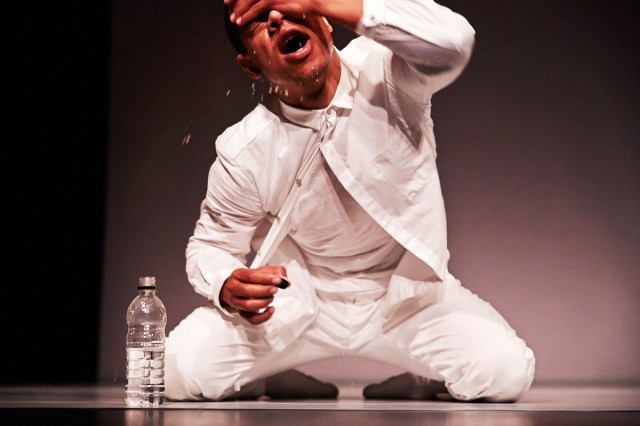
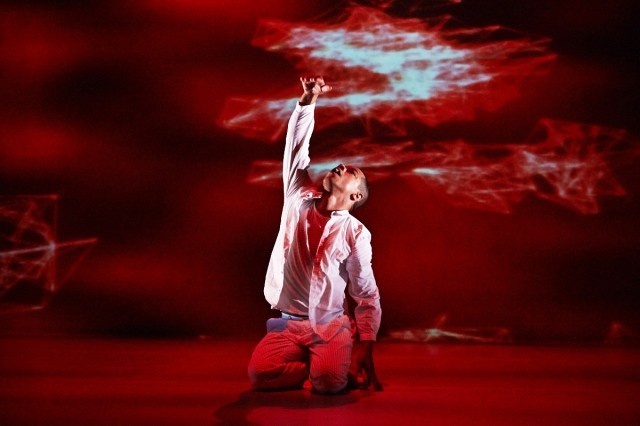
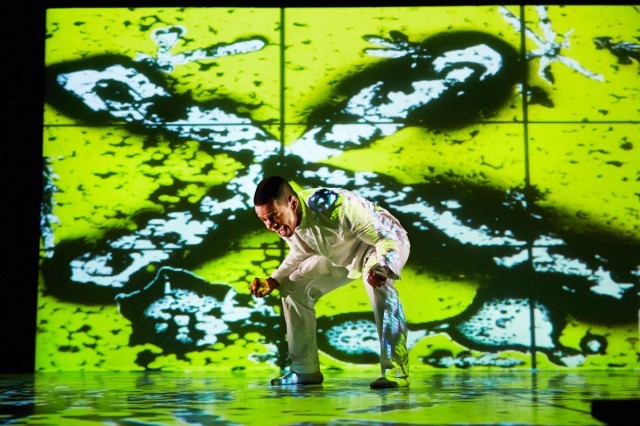
Images by Ambra Vernuccio
Saturday, 18 May 2013
Lakeside Theatre, Colchester
Wednesday, 22 May 2013
Curve Theatre, Leicester, Let’s Dance Festival
Thursday, 27 June 2013
27 & 28 June 2013, Linbury Studio Theatre at the Royal Opera House London
Thursday, 3 October 2013
Axis Arts Centre, Crewe MMU Cheshire
Wednesday, 23 October 2013
Lincoln Performing Arts Centre, Lincoln
Tuesday, 29 October 2013
Bernie Grant Arts Centre, London
Wednesday, 6 November 2013
Hat Factory, Luton
Saturday, 25 January 2014
Rich Mix, London
Thursday, 30 January 2014
Lakeside Theatre, Leicester
Thursday, 6 February 2014
Swindon Dance, Swindon
Wednesday, 12 February 2014
Cambridge Junction, Cambridge
Sunday, 15 November 2015
15 & 16 November 2014, Festival Mix Brasil ,Sala Jardel Filho , Centro Cultural São Paulo- São Paulo, Brazil
Thursday, 12 November 2015
Homotopia Festival, Unity Theatre, Liverpool
Artistic Director & Choreographer Jean Abreu
Performers Jean Abreu
Technical Manager Dom Martin
Software Artists Mirko Arcese and Luca Biada
Composer Paul Wolinski
Costume Designer Richard Nicoll
Lighting Design Michael Mannion
Dramaturg Lootie Johansen-Bibby
Rehearsal Assistant / Understudy Aaron Vickers
Voice Coach Nia Lynn
Photography Paul Scala
Producer Natalie Richardson
Blood was co-commissioned by the Royal Opera House and supported by the PRS for Music Foundation Grant, Gilbert and George, White Cube Gallery.
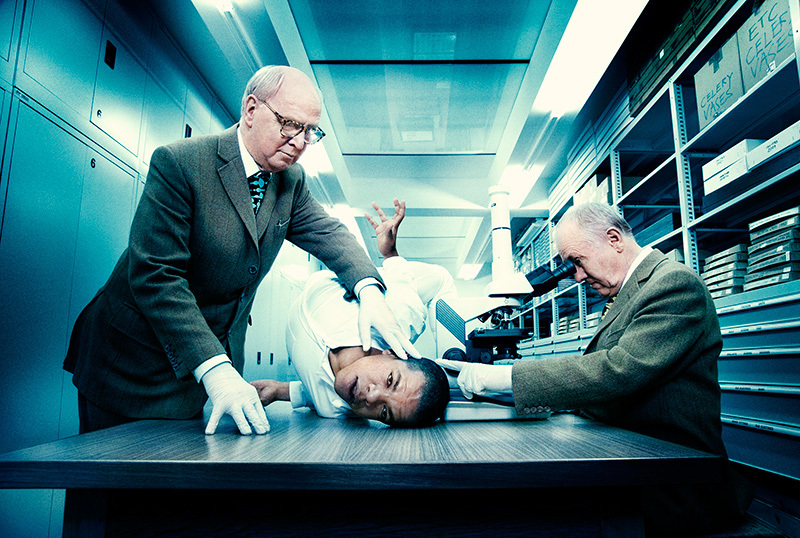
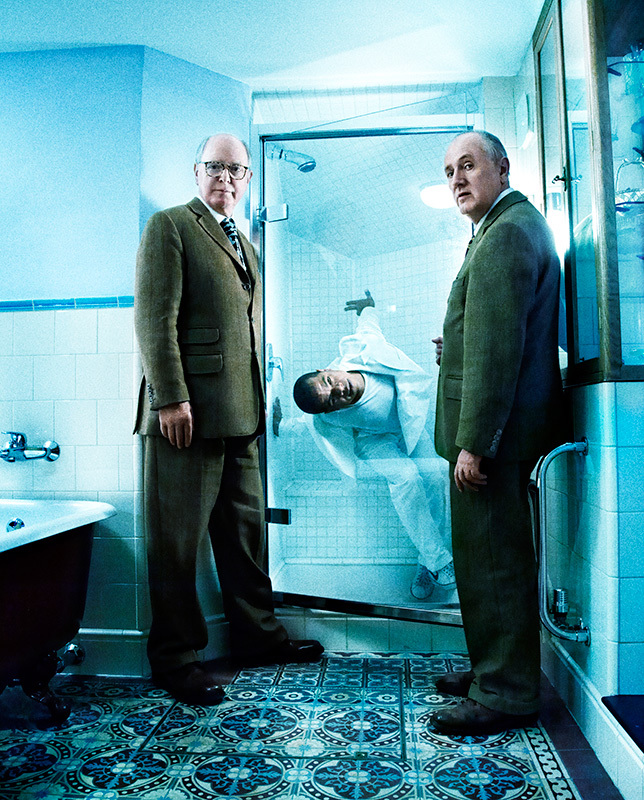
Images with Gilbert & George by Paul Scala
Artists Biography
Gilbert & George began creating art together in 1967 when they met at St Martins School of Art, and from the beginning, in their films and ‘LIVING SCULPTURE’ they appeared as figures in their own art. The artists believe that everything is potential subject matter for their art, and they have always addressed social issues, taboos and artistic conventions. Implicit in their art is the idea that an artist’s sacrifice and personal investment is a necessary condition of art. They have depicted themselves as naked figures in their own pictures, recasting the male nude as something vulnerable and fragile rather than as a potent figure of strength. The backdrop and inspiration for much of their art is the East End of London where Gilbert & George have lived and created art for nearly 50 years. From street signs to Ginkgo trees, from chewing gum stains on the pavements to vistas of urban grandeur and decay, their work is both an ongoing portrait of a city and a reflection on the human condition. Gilbert & George have confronted many of the fundamental issues of existence: sex, religion, corruption, violence, hope, fear, racial tension, patriotism, addiction and death.
‘Our subject matter is the world. It is pain. Pain. Just to hear the world turning is pain, isn’t it? Totally, every day, every second. Our inspiration is all those people alive today on the planet, the desert, the jungle, the cities. We are interested in the human person, the complexity of life.’
Gilbert & George
Gilbert was born in the Dolomites, Italy in 1943 and George was born in Devon, UK in 1942. Gilbert & George live and work in London. Solo exhibitions include Helsinki Art Museum, Finland (2018); LUMA, Arles, France (2018); Museum of Old and New Art, Hobart, Australia (2015); The Museum of Modern Art, New York (2015); Centro de Arte Contemporáneo Málaga, Spain touring to Museum of Contemporary Art, Zagreb (2010); Philadelphia Museum of Art, Pennsylvania (2008); Tate Modern, London touring to Haus der Kunst, Munich, Germany, Castello di Rivoli, Turin, Italy, De Young Museum, San Francisco, California, Brooklyn Museum of Art, New York and Milwaukee Art Museum, Wisconsin (2007–08); Serpentine Gallery, London (2002); Stedelijk Museum, Amsterdam (1996); Milwaukee Art Museum, Wisconsin touring to The Solomon R. Guggenheim Museum, New York (1985); and Whitechapel Gallery, London touring to Stedelijk Museum, Amsterdam and Kunstverein Düsseldorf, Germany (1971). They have participated in numerous group exhibitions including The Museum of Modern Art, New York (2011); Barbican Art Gallery, London (2007); 51st Venice Biennale (2005); 5th Biennale de Lyon, France (2000); Carnegie International (1985); and Turner Prize, Tate Gallery, London (1984).
